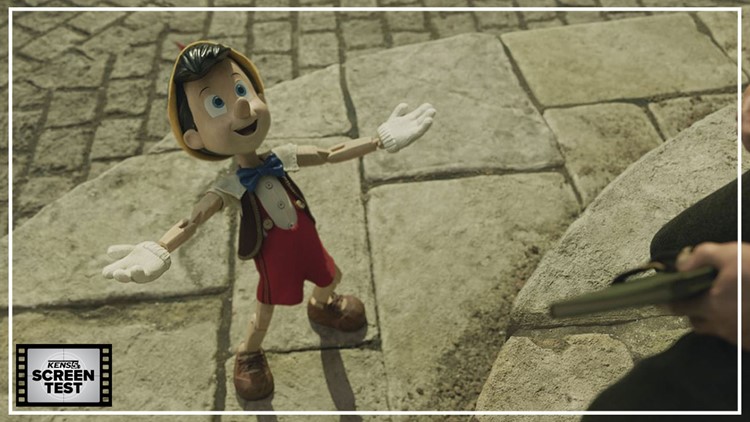TEXAS, USA — In a perverted sense, Robert Zemeckis has been preparing to direct a live-action “Pinocchio” ever since he rode the Polar Express into the uncanny valley of modern digital effects, inadvertently jumpstarting enduring conversations about artifice and truth in cinema as it pertains to the latest leaps in filmmaking technology, and the practical and logical limits transcended therein.
All that history might’ve made for a nice lens through which to watch Zemeckis’s straight-to-streaming “Pinocchio,” if it was any good.
Instead, the movie – releasing to such little fanfare that even the timeless Disney melody sounds a bit off – sleepwalks through a downgraded version of a still-beloved story, failing to make a solid argument that our wooden hero (voiced by Benjamin Evan Ainsworth) has it within him to become a real boy. How can it, when everything around Pinocchio lacks any tactility of its own?
That’s far from a new complaint about the Disney Live Actionaissance, of which David Lowery’s earnest, wink-free “Pete’s Dragon” remains a high-water mark. This time around, however, it’s difficult not to watch the company’s latest green-screened, computer-generated, phony-looking revitalization without wondering to what extent the plastic characters of Zemeckis’s “Polar Express” and “Beowulf” paved the way for this trend of IP self-cannibalization.
Fear not: The humans this time are made of honest-to-goodness flesh and blood, and look like it. They include Tom Hanks as fatherly Geppetto, continuing the typically reliable actor’s recent trend of questionable characterizations; whereas in this summer’s “Elvis” he leaned into each syllable like a crutch, here Hanks speaks like he’s got half a breath for each line of dialogue. His workman’s cottage is ornately decorated and also, curiously, exquisitely uninviting, though the digs are comfortable enough for Joseph Gordon-Levitt’s Jiminy Crickett to hole up one wintry night—setting him on the path to be Pinocchio’s conscience.
You know where the story goes from there. The screenplay from Zemeckis and Chris Weitz mixes and matches devotion to the tale with ill-conceived attempts to tug it into modern times. They largely walk familiar roads, occasionally detouring for frustrating throwaway quips that reek of the duo trying desperately to write to the moment. I sympathize with the voice ensemble, tasked with overcompensating not only for a general sense of lifelessness but also a lack of visual clarity. Pull down all the blinds if you plan to watch “Pinocchio” in the daytime; I squinted my way through its murky world more often than not.
Backdropped by unconvincingly digitized environments devoid of much personality, Pinocchio rarely carves his own path, which makes it hard to imagine him as much more than a bundle of kindling to be inevitably exploited. He winds up in cages and at the whims of schemers, but nothing about his plight sends tremors through the heart. For a company whose history is so steeped in gorgeously animated sincerity, “Pinocchio” emphasizes how Disney’s defining trait as of late is sheepishness.
Credit where credit’s due: In at least one moment “Pinocchio” gets visually creative, literalizing the commercial entertainment industry as a monstrous machine that’s just one gentle push away from collapsing in on itself. And the pay-play-repeat ethos at the heart of this movie’s Pleasure Island lends itself to the sequence in which “Pinocchio” most comes alive, though there’s something a bit squeamish about Disney lightly poking at itself in a time when the company’s outfitted itself in several layers of capitalistic armor.
The dizzyingly brief madness of that Pleasure Island scene aside, “Pinocchio” struggles to justify its existence even on Disney+, where the much more efficient, passionate and memorable original movie remains available. Meanwhile, those insisting on a contemporary version of the wooden boy’s adventures need only wait a few more months for the arrival of Guillermo del Toro’s stop-motion take—by all accounts a perfect pairing of director and material.
Indeed, the recent output of del Toro and Zemeckis resembles a diverging of two roads in the world of contemporary fantasy filmmaking, the latter continuing to insist, without a touch of self-awareness, that there’s something to be gained when you approach stories from a place of displacement. Zemeckis directing this movie lends it an awkward touch of poetry for those who have closely followed the later acts of the former Hollywood wunderkind’s career, if poetry is the kind of thing you’re searching for with this “Pinocchio.” There isn’t much to look for here besides.
"Pinocchio" is rated PG for peril/scary moments, rude material and some language. It's now streaming on Disney+. Runtime: 1 hour, 45 minutes.
Starring Joseph Gordon-Levitt, Tom Hanks, Benjamin Evan Ainsworth, Angus Wright.
Directed by Robert Zemeckis; written by Robert Zemeckis and Chris Weitz.
2022
----
MORE REVIEWS:
- Review: 'Barbarian' gleefully messes with horror customs
- ‘Three Thousand Years of Longing’ Review: A singular and suspect fantasy from George Miller
- ‘Breaking’ Review: John Boyega is magnetic in otherwise congested crime drama
- 'Spin Me Round' Review: Shapeshifting Italy-set mystery, with a dash of disappointment
- Movie review: Beast
- ‘Emily the Criminal’ Review: Aubrey Plaza is at her most blistering in searing crime drama



